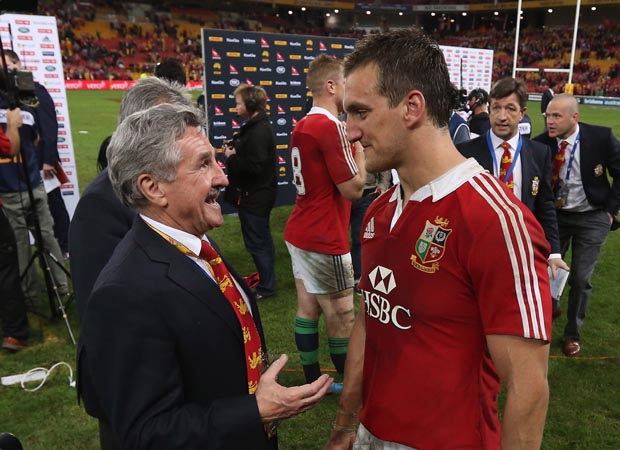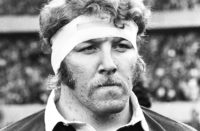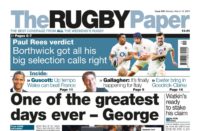 Gerald Davies managed many an electrifying move in his time but none more so than the one that took him centre stage in Port Talbot last Sunday. It put one of the Welsh greats at odds with the leadership of the Welsh Rugby Union.
Gerald Davies managed many an electrifying move in his time but none more so than the one that took him centre stage in Port Talbot last Sunday. It put one of the Welsh greats at odds with the leadership of the Welsh Rugby Union.
Just as in days of yore, he caught the opposition by surprise only this time the opposition were not in the white of England nor the black of New Zealand. They were sitting behind him wearing the red insignia of the WRU at the EGM called by an unprecedented number of clubs.
As a member of the WRU board, Davies could have kept schtum except there was something he knew he had to say. After all the squabbling and conflict, now was the time to let Welsh rugby know where it stood in the eyes of the rugby world.
There would be no side-stepping or pussy-footing round this one. If anything that made his intervention all the more theatrical, a move which took him from the right wing of the stage at the Princess of Wales theatre down to the same level as the rank-and-file from the clubs, to put himself on the same footing in his call for a reunited Wales.
Some saw it as Davies distancing himself from the politburo above him and in particular the two central figures, chief executive Roger Lewis and chairman David Pickering. Instinctively, they would have feared the worst.
Nobody knew Davies intended to say anything. As the last speaker, he timed his run to perfection and delivered an indictment of the Welsh leadership. He also knew he was putting his own head on the block, hence the reference that what he was about to say would not be “too popular with those on the stage”.
“We are not held in high regard,” he said, distilling into carefully chosen words the views of the game's power-brokers the world over as expressed to him in his role as chairman and manager of the Lions. “We are held in low esteem. Our reputation is tarnished and it's depressing that we have such a reputation.
“Men and women of substance say what a shambles that is. We need to govern the game in a way we wish it to be governed and we all need to feel a part of the process.”
Delegates told of how Lewis and Pickering “stared daggers” at their colleague but Davies was up and running, careful at all times to use the collective we, as in “we need to restore our dignity. We need cohesion, collaboration and co-operation. We need the right rugby governance which Welsh rugby can be proud of.”
Nobody has more gravitas in Welsh rugby than Davies, a thoughtful man for whom the knee-jerk reaction and cheap headline are anathema. What he said, therefore, had real impact.
A humble chief executive would have responded by acknowledging that if someone of Davies' stature felt like that, then it was time they all took stock and did something about it. Lewis does not appear to do humility.
Instead he told BBC Radio Wales that it was “very big indeed” of an elected board member, Gerald Davies, to admit his responsibility for some of the reasons behind the calling of Sunday's EGM. Davies, according to Lewis, had “consistently” voted for lower Leagues restructure and that was “out of step with the membership”.
So much, then for boardroom confidentiality but, hey, what does that matter if there is a political point to be scored? So much, as well, for chairman Pickering's pious claim the previous week about the Union maintaining its dignity and not getting involved in slanging matches.
Davies has kept his dignity by refusing to react. According to Lewis, the EGM, as demanded by an unprecedented number of more than 50 clubs, had been “called to create mischief and mayhem”. It was the result, he claimed, of a “virulent, bitter and personalised campaign by a very small group of individuals who set about damaging the reputation of the WRU”.
The reality was that the WRU had caused their own mischief by treating a solid mass of grass-roots clubs so shabbily over the Swalec League restructure that they felt ignored and neglected. Without that single issue, David Moffett, for all his drive and ingenuity, would almost certainly not have got an EGM.
The Union brought that upon themselves. Lewis, of course, attacked BBC Wales for giving Moffett “the oxygen of publicity”, the implication being that anyone who does not toe the party line has no right to be heard.
That sounds all the more preposterous set alongside what happened last January. BBC Wales recorded a Scrum V special about the interminable squabble between the Union and its four regions with Lewis as one of four guests. On more than one occasion a section of the studio audience subjected him to jeers and calls of “answer the question”.
The heavily edited version eliminated virtually every trace of such hostility, provoking complaints, rejected by the BBC, that what was shown had been slanted in favour of the WRU.
At a time when alarmingly few journalists dare to criticise the Union leadership on a variety of issues, Gerald Davies stood up and struck a blow for good old-fashioned values.
What he said had nothing to do with Moffett whom he politely told to mind his own business.
And when Davies had finished telling the membership what he thought of those running the show, Moffett was the first to lead the standing ovation and the first to shake his hand.
*This article was first published in The Rugby Paper on June 22.

























